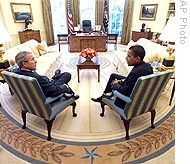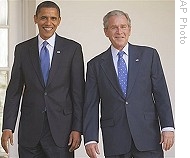-
(单词翻译:双击或拖选)
 |
| Barack Obama (r) and George Bush in the Oval Office of the White House, 10 Nov 2008 |
With the United States facing a major international financial crisis and still engaged in two wars overseas, there are plenty of reasons to ensure the transition from the 43rd president to the 44th is a smooth one.
But the past two Democratic presidents had their share of problems early on, even though both had Democratic majorities in the Congress.
Bill Clinton moved slowly to put his team in place after the 1992 election, and he immediately got bogged3 down in a politically divisive debate over gays in the U.S. military.
Jimmy Carter's transition team prepared well before the 1976 election. But that did not stop in-fighting among White House aides or conflicts among congressional Democrats4 early in his administration.
 |
| Barack Obama (l) and George Bush at the White House, 10 Nov 2008 |
Already, some experts see the Obama team as better prepared to deal with the transition and the first days of governing.
John Fortier is a political expert at the American Enterprise Institute and a guest on VOA's Encounter program.
"I think Obama actually has a chance to do better, certainly than the last two Democratic presidents, Jimmy Carter and Bill Clinton, both of whom had very rocky starts even though they had Democratic congresses," said John Fortier.
Former presidents Clinton and Carter were Washington outsiders bent5 on reforming government. Fortier says Mr. Obama may have an advantage in having served in the Senate for the past four years.
"Also, Barack Obama seems to be showing that he understands the need for Washington experience," he said. "He did this as a junior senator. Many of our recent presidents have been outsiders who in some ways thumbed their nose at the Washington ways and brought in too many people from their home state."
 |
| President-elect Obama and President Bush stand together on the West Wing Colonnade6 of the White House in Washington, 10 Nov 2008 |
Like Clinton and Carter, Obama will have a Democratic majority in both houses of Congress. Democrats in particular have high expectations to quickly change the direction of the country, something they may have to temper early in the new administration.
Tom DeFrank is Washington bureau chief for the New York Daily News who has long covered U.S. presidential politics.
"What I am being told the Obama people are going to do is to start out with things where they are guaranteed legislative7 successes, things that will unite the party and will be popular in the country and don't cost a lot of money," said Tom DeFrank.
Obama won the election in large part because Americans want a different approach on the economy, the number one issue in this year's campaign.
Analyst8 Stuart Rothenberg expects congressional Democrats to defer9 to the new president as he shapes his economic agenda.
"I think the president is going to dictate10 the agenda early on, and I have a hard time believing that huge elements of the [Democratic] Party are going to reject some of his individual initiatives, especially if they are jobs programs, public works programs and even health care," said Stuart Rothenberg.
Republicans are also offering the president-elect some advice. Ken11 Duberstein worked for former President Ronald Reagan. Duberstein says when Reagan was first elected in 1980, Republicans urged him to take on a wide variety of domestic issues in the early days of his administration.
"And the Reagan answer was, no, we are going to focus the country on one major priority," said Ken Duberstein. "That may have some sub-parts to it, but everything we do is going to be about economic recovery."
Another hopeful sign for this transition is the early cooperation between the Obama team and the Bush White House.
Political expert Norman Ornstein spoke12 about that on VOA's Press Conference USA program.
"The biggest change is that President Bush, to his everlasting13 credit, is stepping in with a new transition council and with a very direct effort to try and bring the team that was elected up to speed on national security issues beginning the day after the election," said Norman Ornstein.
Barack Obama will take the oath of office as the 44th president on January 20 of next year.
 收听单词发音
收听单词发音
1
smoothly

|
|
| adv.平滑地,顺利地,流利地,流畅地 | |
参考例句: |
|
|
|
2
initially

|
|
| adv.最初,开始 | |
参考例句: |
|
|
|
3
bogged

|
|
| adj.陷于泥沼的v.(使)陷入泥沼, (使)陷入困境( bog的过去式和过去分词 );妨碍,阻碍 | |
参考例句: |
|
|
|
4
democrats

|
|
| n.民主主义者,民主人士( democrat的名词复数 ) | |
参考例句: |
|
|
|
5
bent

|
|
| n.爱好,癖好;adj.弯的;决心的,一心的 | |
参考例句: |
|
|
|
6
colonnade

|
|
| n.柱廊 | |
参考例句: |
|
|
|
7
legislative

|
|
| n.立法机构,立法权;adj.立法的,有立法权的 | |
参考例句: |
|
|
|
8
analyst

|
|
| n.分析家,化验员;心理分析学家 | |
参考例句: |
|
|
|
9
defer

|
|
| vt.推迟,拖延;vi.(to)遵从,听从,服从 | |
参考例句: |
|
|
|
10
dictate

|
|
| v.口授;(使)听写;指令,指示,命令 | |
参考例句: |
|
|
|
11
ken

|
|
| n.视野,知识领域 | |
参考例句: |
|
|
|
12
spoke

|
|
| n.(车轮的)辐条;轮辐;破坏某人的计划;阻挠某人的行动 v.讲,谈(speak的过去式);说;演说;从某种观点来说 | |
参考例句: |
|
|
|
13
everlasting

|
|
| adj.永恒的,持久的,无止境的 | |
参考例句: |
|
|
|















